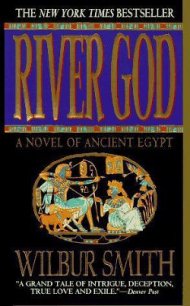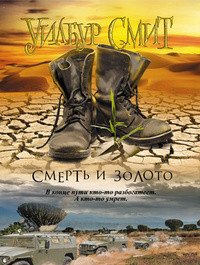Men of Men - Smith Wilbur (книги бесплатно без txt) 📗
Yet there was something else about him that seemed to contradict the first appearance. The high colour in his lips and cheeks was not the flush of health and the open air life. It was a shade hectic, and though the skin was unlined, there were the subtle marks of suffering and pain at the corners of his eyes and mouth, while behind that penetrating gaze, that compelling intensity, there was a tragic shadow, a sense of sadness that was perhaps only readily apparent to the uncomplicated view of a child.
For a moment the man and the boy looked into each other's eyes, and something twisted almost painfully deep in Jordan's soul, a sweet pang, gratitude, puppy love, compassion, hero-worship, it was all of those and something else for which he would never have words.
Then the man stood; he was tall and big built, over six foot in his riding boots, and Jordan only reached as high as his ribs.
"Who is your father, Jordan?" And Jordan was grateful that he did not use the diminutive. The rider nodded at his reply.
"Yes," he said. "I have heard of him. The elephant hunter. Well, then, we had best get you home."
He stepped up into the stirrup and from the saddle reached down, took Jordan by the arm and swung him up onto the horse's rump. Jordan sat sideways, and as the horse started forward, he put both arms round the rider's waist to balance himself.
Jan Cheroot came hurrying from the sorting-table as they trotted into Zouga's camp, and when the rider reined in, he reached up and lifted Jordan down.
"He has been in a fight," the rider told Jan Cheroot.
"Put a little iodine on his cuts, and he'll be all right. The boy has spirit."
Jan Cheroot was obsequious, almost cringing, far from his usual acerbic and cynical self. He seemed to be rendered speechless by the direct and startling gaze of the big man on the rangy horse. He held Jordan with one hand and with the other lifted the old regimental cap from his head and held it against his chest, nodding in servile agreement with the orders the man gave him.
The rider transferred his steady gaze back to Jordan, and for the first time he smiled.
"Next time pick on somebody your own size, Jordan," he advised, took up the reins and trotted out of the camp without looking back.
"You know who that was, Jordie?" Jan Cheroot asked portentously, staring after the rider and not waiting for Jordan's reply. "That's the big boss of the Diggers" Committee, that's the most important man on New Rush, Jordie -" he paused theatrically, and then Announced, "That's mister Rhodes."
"mister Rhodes." Jordan repeated the name to himself, "mister Rhodes."
It had a heroic sound to it, like some of the poetry that his mother had read to him. He knew that something important had just happened in his life.
Every member of Zouga's family and following quickly found his place in the work, almost as though a special niche had been reserved for each of them: Jan Cheroot and Jordan at the sorting-table, the Matabele amadoda in the open diggings, and, naturally there was only one place for Ralph, in the diggings with them.
So they found the stones; they won them from the tiny squares of ground in the depths of the growing pit, and carried them to the surface in the swinging buckets, and carted them out along the rotten crumbling roadways which each day became more dangerous and they washed and sieved them, until at last Jan Cheroot or Jordie could pounce upon them on the sorting-table.
Then in the evening there might be three or four of Zouga's Matabele workmen waiting under the camelthorn tree beside Zouga's tent.
"Let me see," Zouga would grunt, and with a deal of showmanship the man would unknot a scrap of grubby cloth to display a chip of stone or a small transparent crystal.
These were the "pick-ups" from the claims. As the Matabele handled the stuff, shovelling it and emptying the leather buckets, a glitter or shine of a pebble may catch their eye, and there was a reward for a diamond "picked up" and handed in.
Most of these "pick-ups" were not veritable diamonds, for they took anything that sparkled, or anything pretty and unusually coloured.
They brought in agate and quartz, feldspar and rock crystal, jasper and zircons, and once in a while a diamond; and then for each diamond, large or small, clear or discoloured, Zouga would hand over a golden sovereign from his dwindling hoard and add the diamond to the contents of the little chamois leather drawstring bag that he carried buttoned into his breast pocket, and which was under his pillow when he slept at night.
Then each Saturday morning, while Jan Cheroot and the two boys gathered around the camp table under the camel-thorn tree beside the tent, Zouga would carefully tip the contents of the leather bag onto a sheet of clean white paper, and they examined and discussed the week's recovery; and always Zouga tried to cover his disappointment, tried to ignore the nauseating bite of worry in his guts as he looked at the tiny, discoloured and flawed diamonds which the Devil's Own so reluctantly yielded up.
Then with the chamois bag buttoned into his pocket once again, his riding boots freshly waxed and polished by Ralph, his frayed shirt collar neatly darned and the buttons replaced by Jordan, and the gelding curried to a gloss by Jan Cheroot, Zouga would ride into the settlement, putting on the best face he could muster, smoking a cigar to show how little he really needed the money, and he would hitch the gelding at the door of the first diamond-buyer's galvanized iron shack.
"The Devil's Own." The first kopje-walloper was a Hollander, and his accent was difficult to understand, but Zouga's brave show did not deceive him, and he sucked his teeth and shook his head dismally over Zouga's offering. "The Devil's Own," he repeated. "It killed five men, and broke three others. Jocky Danby was lucky to get out at the price you paid him."
"What's your offer?" Zouga asked quietly, and the buyer prodded the scattering of tiny stones.
"You want to see a real diamond?" he asked, and without waiting for Zouga's reply, swivelled his chair" and opened the iron safe on the wall behind his desk.
Reverently he unfolded a square of white paper and displayed the beautiful flashing crystal, almost the size of a ripe acorn.
"Fifty-eight carats," he whispered, and Zouga stared at it with the sour acid of envy in the back of his throat. "I bought it yesterday."
"How much?" he asked, hating himself for the weakness.
"Six thousand pounds!" said the buyer and carefully refolded the paper, placed the diamond back in the safe, locked the thick iron door, hung the key on his watch chain and glanced at Zouga's stones.
"Forty pounds," he said offhandedly.
"The lot!" Zouga asked quietly. He had sixteen men to pay and feed and he needed new rope, and he would have to pay the piratical prices of the transport riders for it.
"The price of pool goods is right down." The buyer shrugged. "Every digger south of the Vaal is bringing in rubbish like this."
Zouga refilled the bag and stood up.
"I made you that price as a favour," warned the buyer.
"If you come back later, it will be thirty pounds."
"I'll take that chance." Zouga touched the brim of his hat and strode out into the sunlight.
The second buyer he visited poured the diamonds into the bowl of the diamond balance and then carefully added weights to the other arm until the scale was in balance.
"You should have stuck to elephant hunting," he said, as he wrote down the weights and made his calculations in a leather notebook. "The diamond market is flooded.




